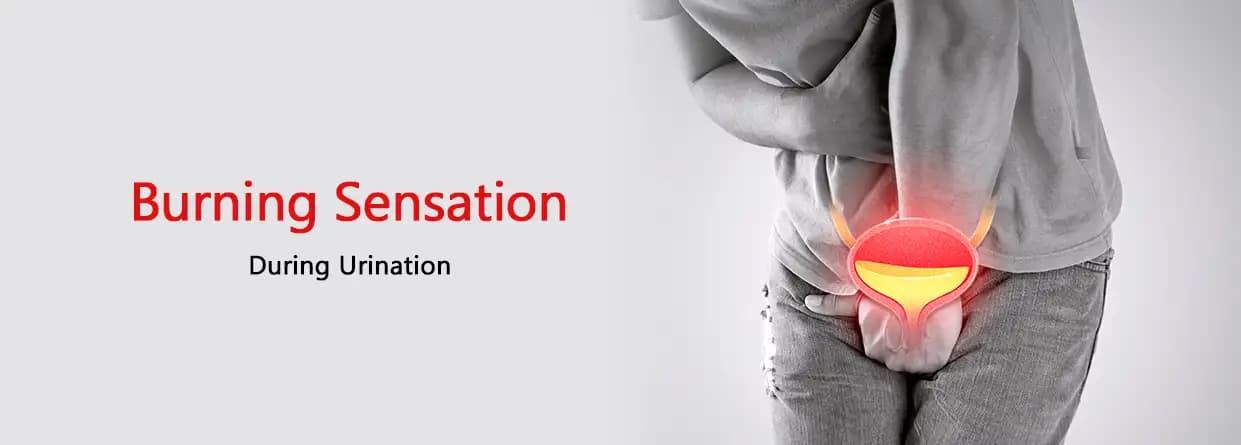
Dysuria, also called painful urination, is not a diagnosis but rather an indication of an underlying health problem. Dysuria can affect men and women of all ages, though it’s more common in women.
The first thing you need to understand is that — dysuria is not a disease or disorder, but a sign and symptom of an underlying medical condition. It causes pain and a burning sensation in the vaginal and penile regions during and after urination.
If you want to understand the nature, causes, treatment, and prevention of dysuria — this blog has everything you need to know. If you're experiencing a burning sensation during urination, don't ignore it. Contact best urologist at CMRI Hospital, Kolkata today for expert consultation and treatment.
Dysuria, also called painful urination, is not a diagnosis but rather an indication of an underlying health problem. Dysuria can affect men and women of all ages, though it’s more common in women.
Dysuria can affect the frequency of your urination and impact your quality of life. Several factors contribute to the development of dysuria.
The causes of dysuria vary in men and women. However, the most common include the following:
This is one of the major causes of painful urination. UTIs can affect any part of the urinary tract, including:
Note:Ureters are two tubes that carry urine from the kidneys to the bladder. The urethra is a tube from the bladder that carries urine out of the body. Kidneys remove waste and extra water from the blood (as urine) and help keep chemicals in the body. The bladder is a part of the urinary system that stores urine.
Urinary Tract Infections are mostly caused by bacteria that enter the urinary tract through the urethra.
Apart from urinary tract infections, STIs can also lead to painful urination. These infections include:
Additional symptoms of sexually transmitted infections may include the following as well:
This is also called prostatitis. A short-term bacteria or chronic inflammation from sexually transmitted infection can cause prostatitis. Other symptoms may include pain in the bladder, testicles, and penis, painful ejaculation, and the need to urinate frequently, especially at night.
This condition can put pressure on the bladder, leading to painful urination. Ovarian cysts can occur in one or both ovaries. Other symptoms may include difficulty realising that the bladder is empty after passing urine.
This occurs when cancer cells develop in the bladder. Pain and discomfort during urination are not typically the early symptoms of bladder cancer. Instead, blood in the urine is. Other symptoms may include frequent urination, difficulty in urination or passing a weak urine stream.
Apart from all the above, other factors that can contribute to dysuria include:
Men and women can both experience pain and discomfort when passing urine, and the causes may be anatomical differences.
For example, women have shorter urethras than men, which allows bacteria to enter the bladder more easily, leading to urinary tract infections.
Dysuria is diagnosed using a combination of the patient's history, a physical exam, and urinalysis. We may recommend additional tests to rule out the root cause.
These tests may include gram strain microscopy, urethra or cervical/vaginal probe, and imaging tests such as ultrasonography or CT scan.
Treatment of dysuria depends on the cause and severity of the pain and burning sensation. Our first step is to identify the root causes of the problem, whether it's infection, inflammation, dietary factors or issues with the bladder or prostate. Then start the treatment accordingly.
If your symptoms don't improve after two to three days, you should consult a specialist immediately. For personalised treatment, you can book an appointment with us.
It is rightly said that “prevention is better than cure.” Just like any other health condition, dysuria can also be prevented easily.
To save yourself from this painful condition, we recommend you follow the below tips.
Men and women should:
Since women are at a higher risk of developing dysuria, they should avoid using harsh soaps, douches, and vaginal sprays, and change tampons frequently.
Additionally, as a parent you should limit bubble baths for your little girls and extended play in wet swimsuits. This can cause inflammation of the vulva (vulvitis).
Urination can be painful and daunting due to dysuria, which involves pain, a burning sensation, and discomfort in the vaginal and penile regions. If you are dealing with this health problem, you can book an appointment with us at the CK Birla Hospital.
We use advanced technologies to provide accurate diagnoses, and keeping your unique needs in mind, develop a customised treatment plan to help you overcome your problem.
No, a burning sensation and pain while urinating can have many causes, including non-infectious conditions such as inflammation, medication, skin conditions, trauma, interstitial cystitis, benign prostatic hypertrophy, tumours, and menopause.
Yes, certain home remedies can help you relieve pain and burning sensation. This may include drinking an adequate amount of water, avoiding irritants, applying a heating pad, and taking cardamom. However, we suggest you consult a specialist before taking anything.
Yes, certain foods and drinks can irritate your bladder, leading to pain and a burning sensation while urinating. This may include acidic foods, spicy foods, alcohol, carbonated and cold drinks, caffeinated beverages, artificial sweeteners, etc.
Written and Verified by:

Dr. Pankaj Kumar Gupta is a Consultant in Urology Dept. at CMRI, Kolkata with over 10 years of experience. He specializes in renal stone management, prostate & uro-oncology surgery, reconstructive urology including urethroplasty.
Similar Renal Sciences Blogs
Book Your Appointment TODAY
© 2024 CMRI Kolkata. All Rights Reserved.